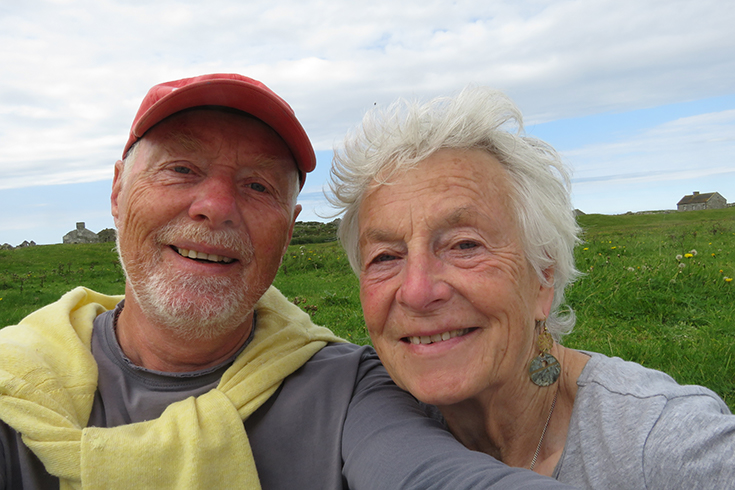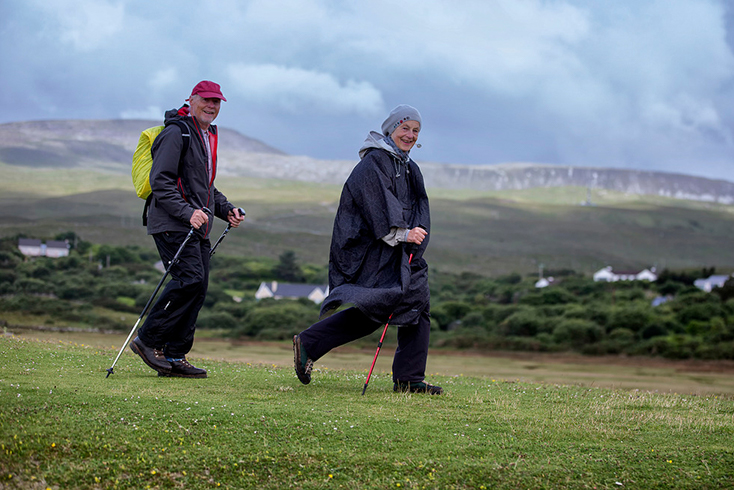
MAYO PARADISE MADE POSSIBLE
‘Mayo, God help us,
(as they used to say in the past),
to make paradise possible’.
This was our prayer, our hope and longing once we had moved to County Mayo.
Originally from Vienna and Hamburg, we, Georg and Bettina, lived for a few years in the countryside in Austria before coming to Mayo with our small daughter in March of 1984. We had the dream of starting a new life from scratch. The organised way of farming and planning in Austria and the lack of wilderness and our wish to pioneer into something new had set us in motion and had planted the dream of an adventure in our minds.
At the time Ireland and especially County Mayo was poor and many people had to emigrate. Ireland was called the ‘poor house of Europe’. During our very first visit, we travelled through Connemara, Sligo and Donegal looking for a place. Used to the lush Austrian countryside, we felt on one hand disillusioned and appalled by the lack of abundance, outer beauty, colour and care but then again and again were inspired by a few places where people had through hard labour transformed exposed and infertile land into beautiful gardens. Those places gave us hope that paradise was possible.
Finally we came to County Mayo and were shown an infertile, bare hill consisting of bog land, overlooking a small lake, situated at the edge of the county town of Castlebar. No bush or tree or wild flower was growing on the land, no road led up to the place, and there was no electricity or water supply. For years the land had been used to cut turf and to graze cattle. We looked onto two small neighbouring houses, one to the right of the lake, the other to the left and otherwise into the far distance and the hills of Mayo, above us a seemingly endless and always changing sky. In the beginning of our life here and on early mornings looking around me, I remember feeling as if I had been dropped back into the beginning of time, when all was still and pure and innocent.
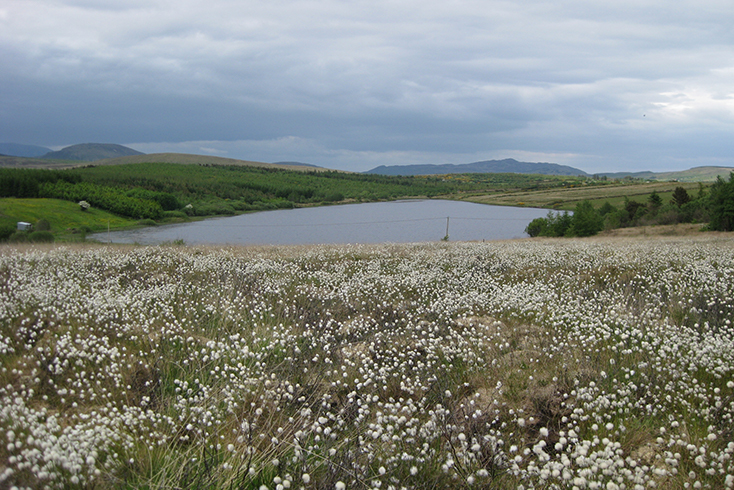
We started our life by renting a house in town and building a road onto the land. Next we left the town house and moved a caravan onto the land in which we lived for about two years. I remember a visitor coming up to our place and at the end of his visit saying ‘I will light a candle for you in winter’. We had no idea then what he meant, but were soon to experience it for ourselves.
We began to plant some 3.000 tiny, bare rooted trees to create some ‘shelter from the storm’ and this was the beginning to make our dream of paradise come true.
We felt like pioneers. We had started an adventure and would not give up. On early mornings we swam in the dark bog lake which every morning gave us strength to get through the day and to keep the hope alive.
We intended to make the impossible possible and transform the wet, dark bog land into a rich and fertile park land which would one day serve us and other people. Without electricity or a water supply we started to build our dream house, which until now only existed in miniature format made out of cardboard. It was to be built in timber and in form partly round, ideas which at the time were our dream but totally alien to this new country. Part of our dream was to build the future house with other like-minded people, for Georg to lead the project and to include Bettina and our small daughter in the process. Inclusion on all levels versus separation was our dream motto. Whatever conflicts arose during this time, we tightly held onto our dream, never mind if the storms were shaking the structure, people did not show up, materials were not to be got.
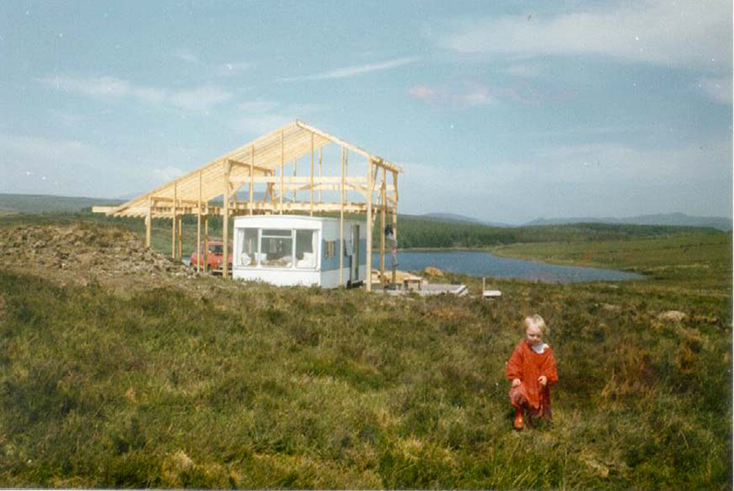
Once we had built enough space to move into the house, we were able to acknowledge for the first time our deep existential fears which had emerged in the process of building, our feelings of alienation and the ensuing culture shock. Our dream of a new life, abundance and freedom clashed with everything people believed in and held dear in the new country, but at night sitting in the candlelight and listening into the deep silence surrounding us we re-confirmed our dreams and found solace and hope in them.
One by one electricity was brought to the houses around the lake and this was followed by being connected to the main water supply and in some ways and with time we also felt slightly more connected to the community around us. Our elderly neighbour approached us with the idea of inviting the larger neighbourhood into the house and for a neighbourhood mass being held in our yet unfinished house. We gladly followed that offer and thus could show people our house.
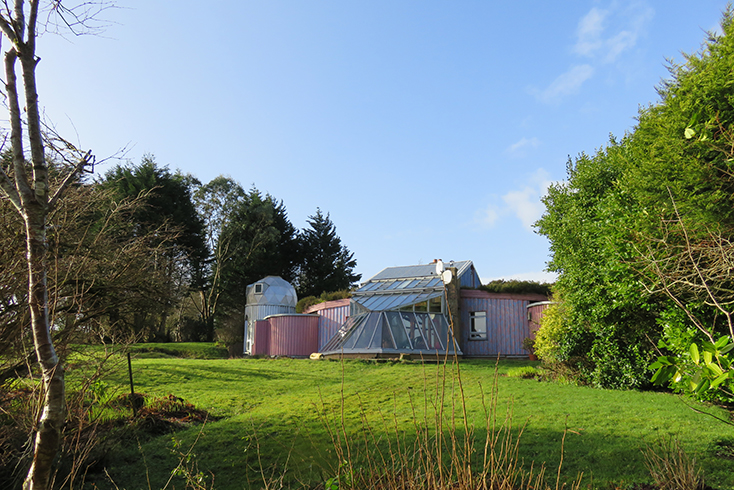
Our second child was born and soon after we were told by a neighbour that from the start we had had no right to build our house or develop the place in any way, because old burdens to cut turf were on the land, which we had not been told about. For seven years we were worked on clearing those burdens on our land with solicitors, who mostly declined to take responsibility. This process mirrored our very own unfinished business, which we had unconsciously brought with us into the new country. From this process we learned about persistence and patience and going deeper within, virtues we had never acquired in the past.
Our former neighbours to the right and to the left all left their homes within the same year and we felt almost forced into a period of loneliness, withdrawal from the world and introspection. Parallel to this we taught our children at home, something that was permitted in Ireland but would have been forbidden in our native countries.
Life around us changed drastically during the so called ‘Celtic Tiger’ years in the 90’s. New cars were acquired, houses and roads were built, a variety of new shops came into town, divorce was legalised, people from other cultures came into the country, people travelled more and emigrated less and mindsets were changing. So did our place, where the trees had grown tall and were giving shelter, flowers were in bloom and brought colour and diversity into the bog land. Wildlife was beginning to thrive, which we had experienced as barren in the beginning.
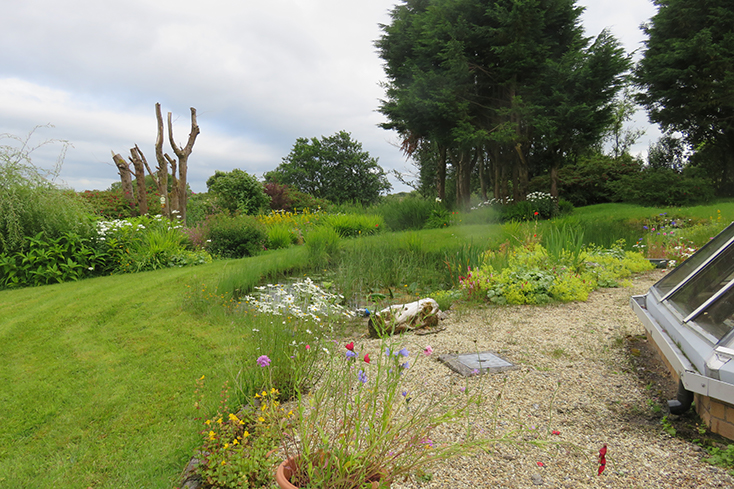
Years later our children left for college and we opened up ourselves and the place, we called home, to new endeavours. Georg worked as an architect (which had been his former profession back in Austria). Bettina taught young people German and facilitated workshops for creative writing in the community. Together we brought facilitators of other workshops and groups (and with that people) to the place and into the house. In small measure the place served us and others, as we had envisaged in the beginning.
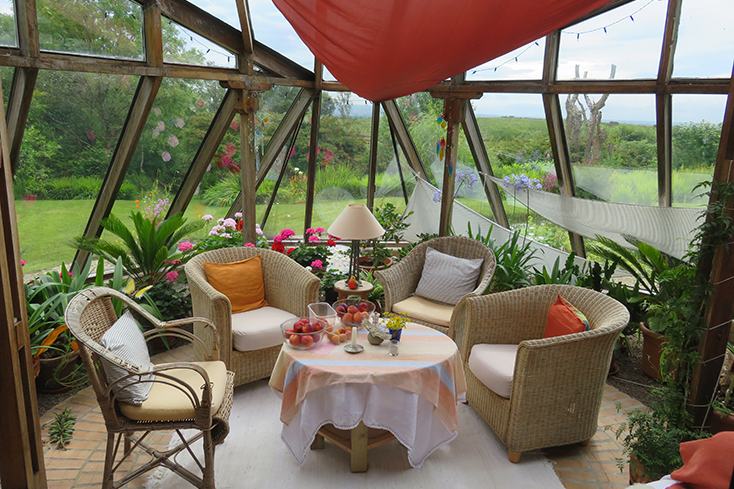
County Mayo, this place of ours and the people have taught us many life lessons, we feel we would have never learned or come across anywhere else. The deepest lesson it taught us was that the envisaged and hoped for paradise of peace and abundance and joy can never be found outside but lives inside of us. We often do not dare (or even attempt) to look inside of us, as we are brought up and conditioned to look outside for what lives within.
County Mayo taught us that we have to face and move through the dark and empty desolation, if we want to find paradise, true peace and happiness. This darkness can often be mirrored outwardly on one of the many gloomy, grey and wet days. Magic happens, when suddenly the sky opens, the clouds disperse and another vista is exposed, one of a landscape bathed in a dazzling light, in almost supernatural beauty and clarity. How often have we gazed out over the breathtaking scenery laid out before us in such moments and expressed our deepest gratitude for the fact that we can live here and witness this almost surreal beauty.
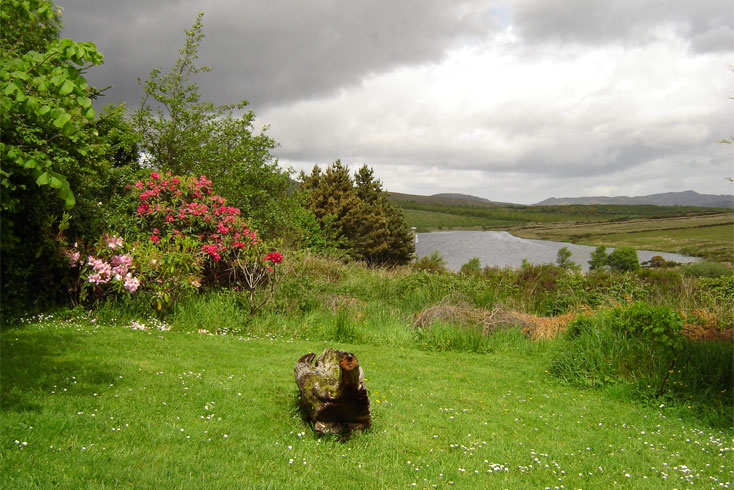
We are reminded of paradise without having to seek it in the far distance, nor have we to travel widely to reach such destinations, views and white sandy and empty beaches. The next moment again, the sky closes and it might all vanish before our eyes and all we can see is darkness below and above. On other days the landscape is shrouded in mystery and we can hardly make out anything in form or the landscape seems wrapped up and enclosed in a kind of melancholy and sadness. Each outer mood we witness can become a mirror of one of the many moods residing within us.
County Mayo therefore has the amazing ability (more than any other that we have come across) to teach those that come here (called the ‘blow ins’ by the locals) the virtue of introspection and facing themselves in order to eventually find their way home.
One day the county might remind us of our inner shadows, our dismay, gloom and sadness and another of our hope, light, brilliance and beauty. Here exists an always present and living reminder of our duality and the impermanence of our existence.
County Mayo can serve as a wise teacher, if we are willing and decide to learn those lessons. Once they are acknowledged, accepted and learned, true paradise is possible and can be experienced wherever we go or find ourselves. Therefore, in our experience and in our view, Mayo can indeed help us make paradise possible.
Bettina and Georg Peterseil
Castlebar October 2016
